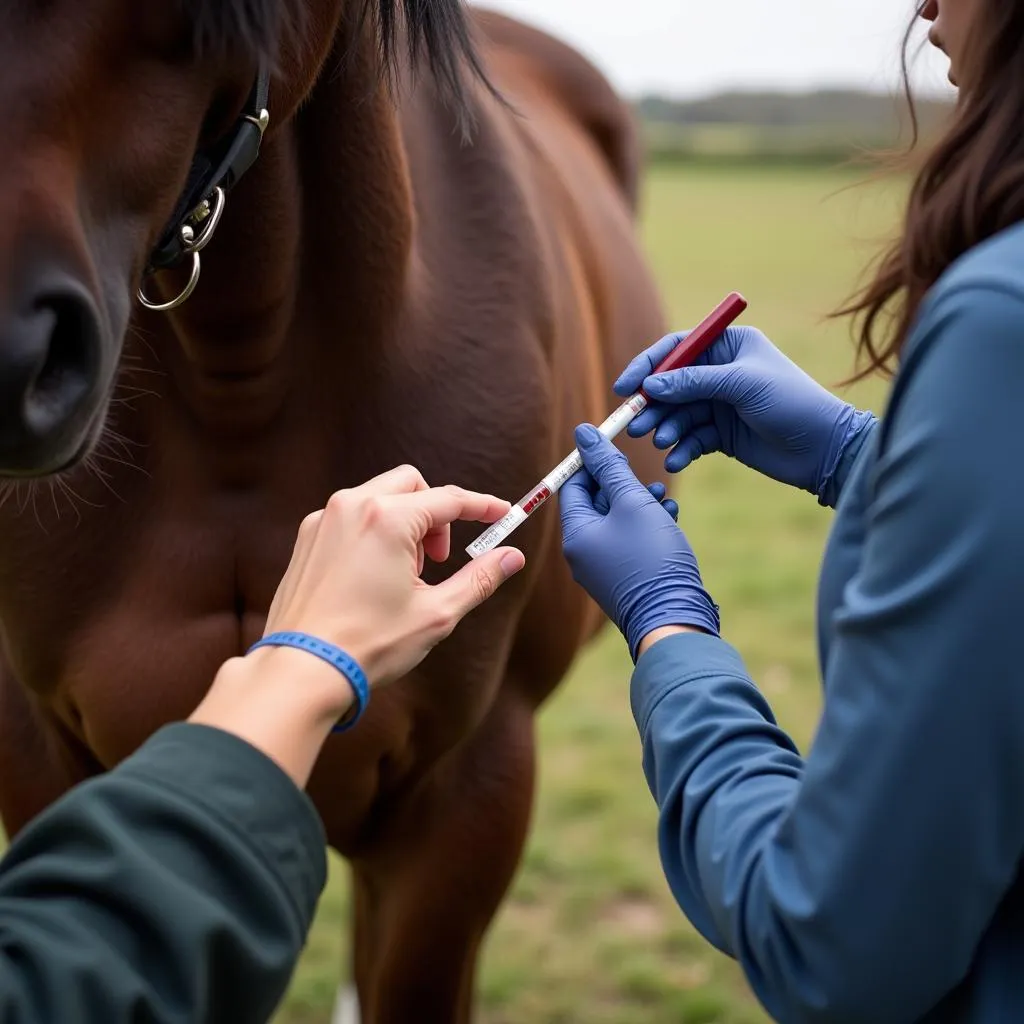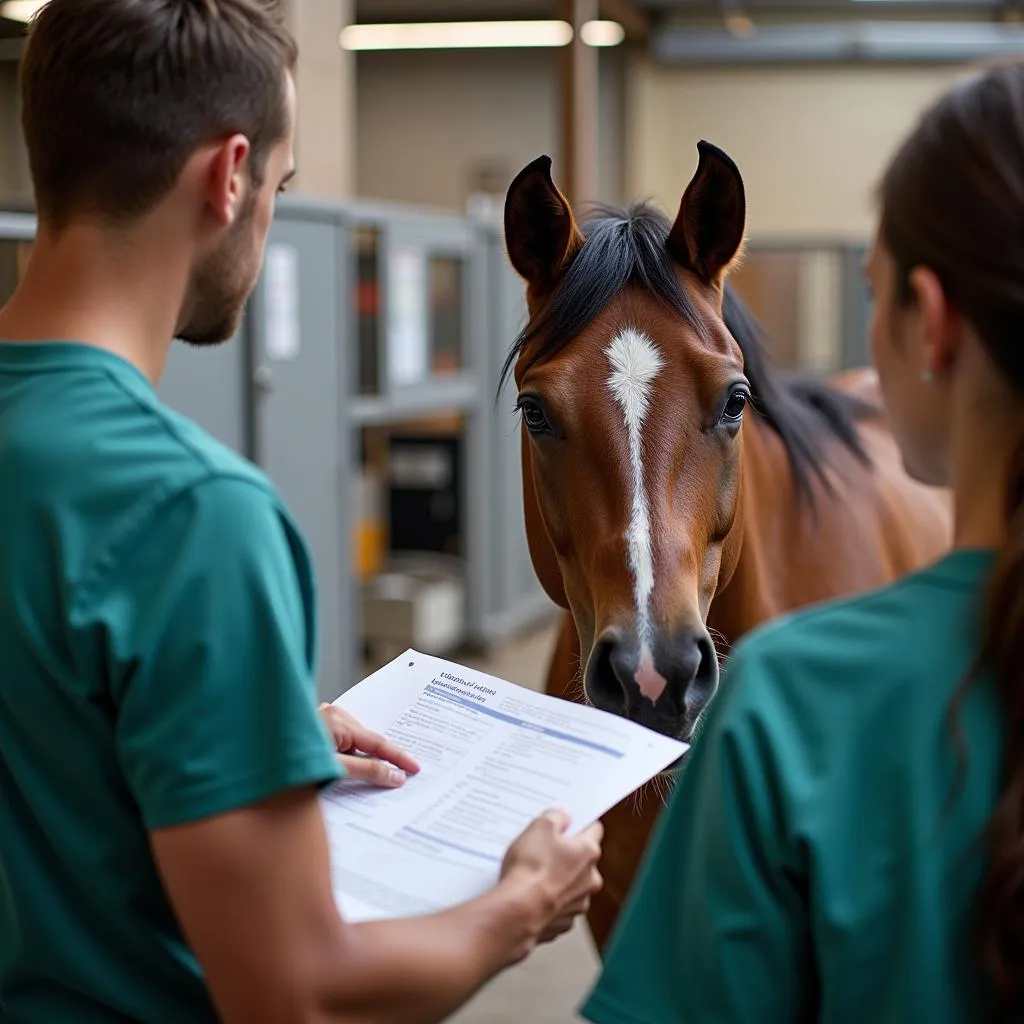This comprehensive guide provides a detailed explanation of Horse Se (serum enzyme), its importance in equine health, and how to interpret its results. This information is essential for every horse owner, as it can help you identify potential health issues early and make informed decisions about your horse’s care.
What is Horse SE?
Horse SE, or serum enzyme, refers to a specific type of enzyme found in the blood that can indicate certain health problems. Enzymes are proteins that catalyze (speed up) biochemical reactions within the body. When tissues are damaged, enzymes are released into the bloodstream. Measuring these enzymes can provide valuable information about the horse’s health and potential issues.
Why is Horse SE Important?
Monitoring horse SE levels can be a crucial tool for early diagnosis and treatment of several conditions. Some of the main reasons why monitoring SE is important include:
- Detection of Muscle Damage: Increased SE levels can indicate muscle damage caused by strenuous exercise, injuries, or certain diseases.
- Early Detection of Liver Disease: Elevated liver enzymes can be a sign of liver damage or dysfunction, a serious concern in horses.
- Assessment of Pancreatitis: Specific enzymes like amylase and lipase can be elevated in cases of pancreatitis, an inflammation of the pancreas.
- Monitoring of Inflammatory Conditions: Some enzymes, like CPK (creatine phosphokinase), are markers of inflammation and can help monitor the effectiveness of treatments.
What to Expect When Testing for Horse SE
Before testing for SE, it’s essential to consult with a veterinarian. They will determine the appropriate tests based on your horse’s health history, clinical signs, and potential diagnoses.
 Horse SE blood test
Horse SE blood test
Here’s a breakdown of what to expect during the testing process:
- Blood Collection: A veterinarian will collect a blood sample from your horse, typically from the jugular vein.
- Laboratory Analysis: The blood sample is sent to a laboratory for analysis.
- Results: The laboratory will provide results, which will typically include the levels of various enzymes.
Interpreting Horse SE Results
The results of a horse SE test should always be interpreted by a veterinarian. They are the best equipped to analyze the results in conjunction with your horse’s history, clinical signs, and other diagnostic tests.
 Horse SE test results
Horse SE test results
Here are some general guidelines about SE results:
- Normal Ranges: There are established normal ranges for horse SE levels. However, these ranges can vary depending on the laboratory, breed, and age of the horse.
- Elevated Levels: Elevated SE levels usually indicate tissue damage or inflammation.
- Decreased Levels: Low SE levels can be less common but may suggest certain health conditions or nutritional deficiencies.
What to Do If Your Horse’s SE Levels Are High
If your horse’s SE levels are elevated, it’s crucial to consult with a veterinarian immediately. They will determine the underlying cause, recommend further diagnostics, and develop a treatment plan. Treatment options may vary depending on the underlying cause of the elevated SE.
 Horse owner talking to a veterinarian
Horse owner talking to a veterinarian
Here are some common treatment approaches:
- Rest: Providing your horse with adequate rest is essential to allow damaged tissues to heal.
- Pain Management: Analgesics may be prescribed to alleviate pain and discomfort.
- Anti-inflammatory Medications: Non-steroidal anti-inflammatory drugs (NSAIDs) can help reduce inflammation and pain.
- Nutritional Support: A balanced diet and proper supplementation can promote healing.
Proactive Management of Horse SE
Regular monitoring of your horse’s SE levels can be a valuable tool for proactive health management.
****
Here are some tips for proactive management:
- Regular Checkups: Schedule regular veterinary checkups for your horse, including routine blood tests.
- Know Your Horse: Be familiar with your horse’s normal behavior and any changes that may indicate potential health issues.
- Monitor Exercise: Gradually increase your horse’s exercise intensity and duration, and provide adequate rest.
- Proper Nutrition: Feed your horse a balanced diet that meets its individual needs.
FAQ:
- How often should I test my horse’s SE levels? This depends on your horse’s health history, age, and risk factors. Discuss a testing schedule with your veterinarian.
- What is the best way to prevent high SE levels? Proactive management, including regular checkups, balanced nutrition, and appropriate exercise, can help prevent high SE levels.
- Are there any home remedies for high SE levels? No, it’s crucial to consult with a veterinarian for diagnosis and treatment.
- Can I use over-the-counter medications for high SE levels? Never give your horse any medication without consulting with a veterinarian.
- What if my horse’s SE levels remain high despite treatment? Continue working with your veterinarian to investigate potential underlying causes and refine the treatment plan.
Conclusion
Understanding Horse SE is essential for any horse owner who wants to provide the best possible care for their equine companion. Monitoring SE levels can help detect potential health issues early, leading to timely treatment and a better quality of life for your horse. Remember to consult with a veterinarian for accurate diagnosis, treatment, and guidance on proactive management.
For any further questions or assistance, feel free to contact us at:
- Phone: 0772127271
- Email: [email protected]
- Address: QGM2+WX2, Vị Trung, Vị Thuỷ, Hậu Giang, Việt Nam
We have a 24/7 customer support team available to assist you.